What are the benefits of using face masks regularly?
What are the benefits of using face masks regularly?
Face masks are usually reminiscent of childhood sleepovers and pampering sessions after a hard day. However, including face masks in your skincare routine can help give your skin that needed extra boost. Using a face mask regularly can help to target your skin concerns, with some face masks giving instant results. This piece will advise you on the benefits of using facial masks regularly, and how to include them in your routine.
Click on a link to jump to that section:
The key benefits of using face masks and why you should consider including them in your skincare routine.
Read the specific benefits of choosing gel masks and sheet masks.
Read our guide to the benefits of popular homemade face mask ingredients, such as lemon and honey.
The overall benefits of using face masks
Face masks provide a deep cleanse
While you may use a cleanser to rid your skin of bacteria, oils and impurities, it is important to consider a deeper cleanse. A good cleanser doesn’t always reach beneath the outer layer of skin to extract the dirt, whereas a good face mask will. It is recommended to include a face mask in your routine a couple of times a week, as with all skincare products, a one-time application won’t provide a permanent fix.
Recommended cleansing face mask
L'Oreal Paris Pure Clay Purity Mask 50ml
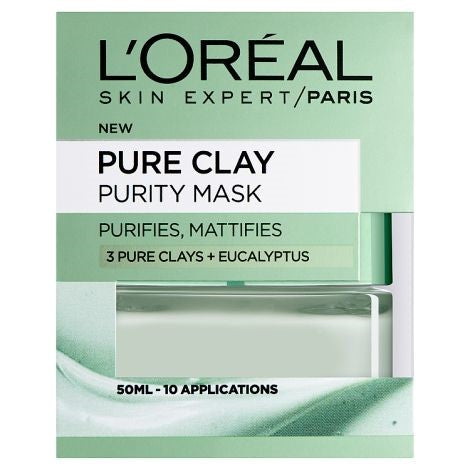
- Enriched with Eucalyptus Extract
- Creamy texture
- Works deep into your pores
- Does not dry out the skin
- Creates matte-looking skin
- Relaxing fragrance
Price: €12
The ultimate hydration
Face masks are commonly used to hydrate the skin. When you apply a face mask, the mask acts as a barrier between your skin and the air. This is because it blocks the loss of water from your skin to the air (through natural evaporation) during the use of the mask and instead helps the hydrating ingredients penetrate deeper into your dermis layer. Using hydrating masks is particularly beneficial when applied to dry skin or dehydrated skin.
Recommended hydrating mask
Garnier Moisture Bomb Green Tea Hydrating Face Sheet Mask
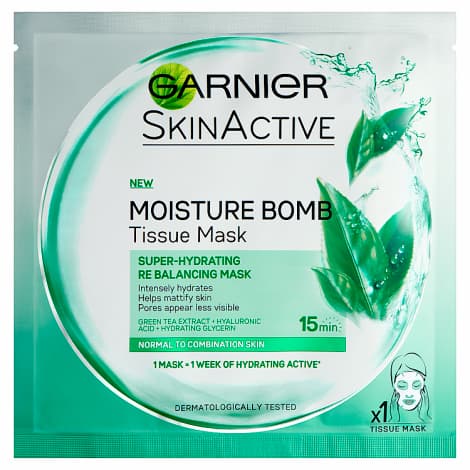
- Super-hydrating
- Re-balancing mask that intensely hydrates, helps mattify skin and pores appear less visible
Price: €4.50
Minimising pores
While pores play an important role in keeping our skin healthy by releasing toxins and keeping us cool, their appearance on our face can be very annoying. Using a clay mask can dry out the sebum which sits underneath the pores, therefore, helping to reduce and refine their size.
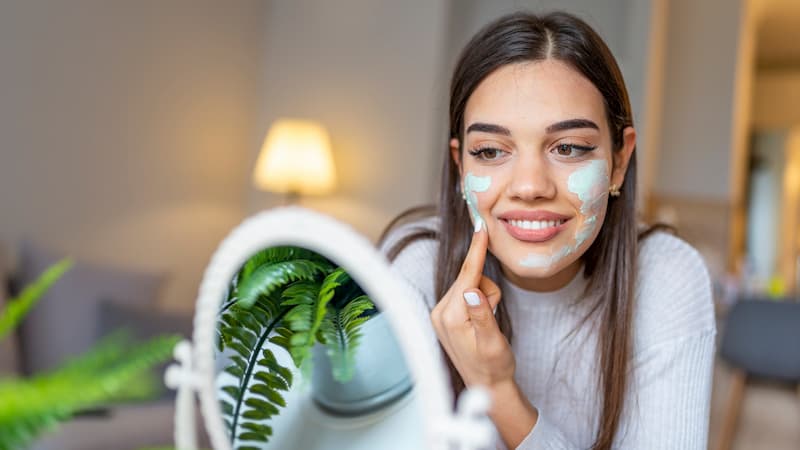
Recommended pore minimising face mask
Loreal Pure Clay Detox Mask
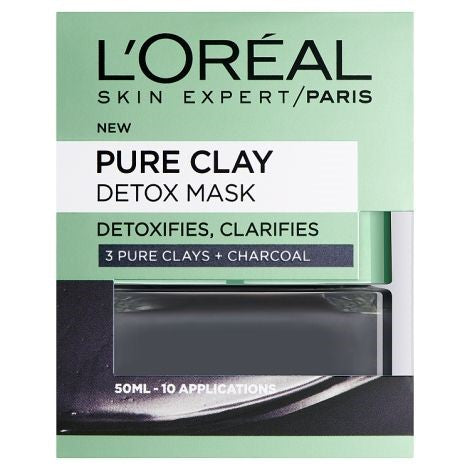
- Enriched with Black Charcoal
- Creamy texture
- Cleansing mask
- Draws out impurities
- Relaxing fragrance
Price: €12
Reduce redness and even skin tone
It can be quite frustrating if your skin suffers from redness or dark spots, particularly if you find it difficult to find a product to reduce these problem areas. Some masks that contain calming ingredients such as chamomile, jojoba oil and aloe vera can help reduce redness and even out skin tone.
Recommended face mask for reducing redness
Moisture Bomb Tissue Mask
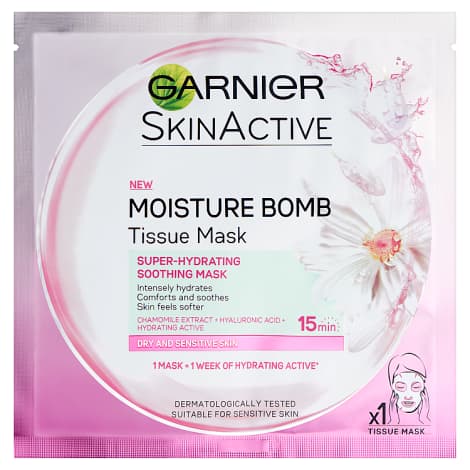
- Soothing mask that intensely hydrates, comforts and soothes Skin feels softer
- Infused with soothing chamomile
Price: €4.50
Face masks have anti-ageing benefits
The best mask to use to protect your skin from anti-ageing and to reduce fine wrinkles would be an overnight hydrating mask. Look for masks that include ingredients such as Vitamin E, Collagen, Niacinamide, Hyaluronic Acid, Vitamin C and Alpha Lipoic Acid.
Recommended anti-ageing face masks
Clarins Super Restorative Instant Lift Serum Mask
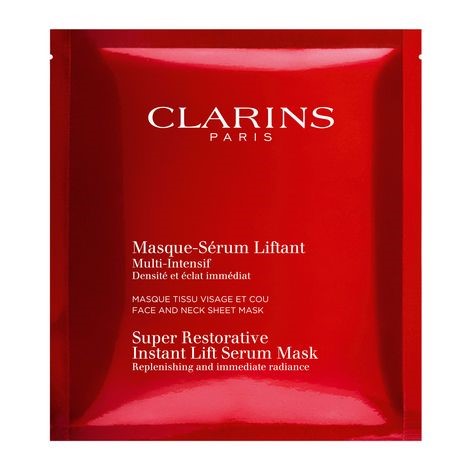
- Lifting and plumping effect
- Instant firming of the skin
- Wrinkles are smoothed, slackened skin is tightened and radiance is restored
Price: €18.00
Oil Control
Oily skin is usually caused by the overproduction of excess sebum, which is the natural oil that protects and hydrates our skin. This overproduction is often caused by hormones; therefore, no product will outright ‘fix’ this problem. The good news is a good face mask can help decrease oily skin by absorbing the oils and improving the natural hydration and moisture, meaning that your skin will be less likely to overproduce oils. The best ingredients to use are oil-absorbing such as clay or charcoal; however, it is important to moisturise after use.
Recommended mask for oil control
7th Heaven Charcoal Mask

- Enriched with Birch Leaf, Witch Hazel & Charcoal
- Draws out impurities
- Soothing & calming formula
- Leaves skin feeling smooth & clean
- Peel off mask
- Removes deal skin cells
Price: €2.15
Types of face masks and their benefits
Now we’ve discussed some key active ingredients in face masks and how they can help skin concerns, let’s look at two popular kinds of masks:
Sheet Masks
Sheet Masks are an easy way to add serums into your skincare routine and would benefit any skin type. The sheet itself creates a seal on your skin just like other face masks. In sheet masks, the moisture and vitamins from the serum used on the sheet can’t escape and have to soak into your skin.
Gel Masks
Gel Masks are perfect for dry and sensitive skin. By nature, the masks are often cooling and soothing and of course, hydrating. Most often, the key ingredients in a gel mask will be collagen and antioxidants, which help skin recovery.
The benefits of homemade masks
There are many recipes online for creating your own face mask. It’s always best to use the mask on the day you have made it for the ingredients to be most effective.
Benefits of ingredients in homemade face masks:
- Honey – A natural deep cleaning ingredient, honey can soften skin, moisturise and unclog pores.
- Avocado – A great creamy base to most DIY masks, avocado is full of high fatty acids and vitamins to help smooth skin textures
- Lemon – Rich in vitamin C and citric acid, lemon juice is perfect for brightening dark spots and reducing blemish scars.

- Matcha – Matcha features anti-inflammatory, anti-microbial properties. It helps to reduce excessive oil production by regulating your hormonal response to androgens.
- Oatmeal – Oats are typically very gentle and if used on your skin are anti-inflammatory, which soothes irritation and calms redness.
- Sudacrem - Sudacrem has fantastic properties that help fight and prevent acne, but it can be too drying if you use it too often.
- Yogurt – Using plain yogurt in your DIY face masks can aid the fight of anti-ageing and the reduction in the appearance of pores.
How do I include face masks in my routine?
Using a face mask doesn’t have to take up your entire evening or be a special occasion, as most face masks only need to be applied for 15 minutes. There may be ample time in your evening or morning routine to include a face mask application. Here are some ways you can make face mask applications part of your lifestyle:
- Use a wash-off face mask in the shower. Put on a face mask as soon as you jump in the shower. By the time you are scrubbed clean it should be ready to gently wash off.
- Catching up on your favourite TV programme in the evening? Cleanse your skin and put on a peel-off face mask or a sheet mask before carrying on with your skin routine once the show has ended.
- Use an overnight mask while you sleep. After cleansing, instead of using your night-time moisturiser, pop on the mask and enjoy some beauty sleep.
When you use a face mask, it is important to always apply to them a cleansed, clean face. You should also always moisturise after using face masks to prevent them from drying out the skin.
You can find out how often to use face masks in our guide.
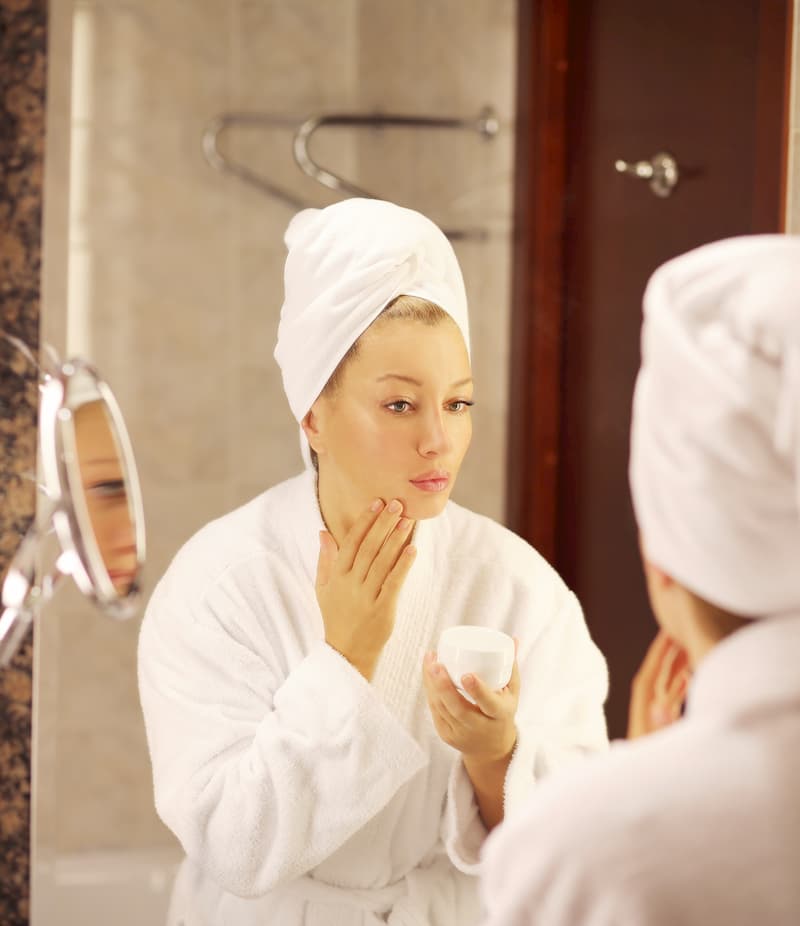
What are the costs of face masks?
Your first search for the perfect mask may come back with expensive brands, but it is important to do a little research into the products and whether a cheaper brand can offer the same ingredients.
Remember that expensive doesn’t always mean better quality and quite often products bought on a lower budget can achieve the same results as its premium counterpart.
For example it is entirely possible to get quality face masks, of all varieties under €10. You can narrow your search down by skin concern, ingredients and type of mask.
FAQs
Which face mask is best for glowing skin?
The best face mask for glowing skin would be ultra-hydrating and contain a blend of vitamin C type ingredients. This can come in the form of a sheet mask, clay mask or an overnight mask.
How do you know which face mask will work best for your skin type?
You can read our guide to choosing a face mask for your skin type and condition here.
If you are worried about your skin, you can visit a dermatologist who can help you identify your problem areas.
When and how often should you use a face mask?
You should be using a face mask in your skincare routine at least once a week. Depending on your skin type and the type of mask, this can also be increased to a couple of times a week. If the mask is hydrating, you can generally use it more often than a mask that can potentially dry your skin out.
Read our guide to how often you should use a face mask here.
Can you use more than one face mask in a day?
You can use more than one face mask in a day, as long as the properties in the masks are very different. For example, don’t use two clay masks as this would dry your skin out.
How long should you leave your face mask on?
Always follow the advice on the packaging. You will find most masks suggest 15 minutes is a perfect time, except for overnight masks of course.

